- Home
- Antonia Fraser
My History Page 3
My History Read online
Page 3
Even a story told by my mother about their first date in a restaurant—my father neither confirmed nor denied it—seemed to indicate the gap between them at that time. The meal was over. Wine remained. The lights were low over the little table. Then Frank leant forward and began to recite:
“Now sleeps the crimson petal, now the white…” He continued to the end of the poem:
So fold thyself, my dearest, thou, and slip
Into my bosom and be lost in me.
Elizabeth was just about to murmur: “I love Tennyson” when Frank said shyly but with determination: “I wrote that.” What was the proud young English scholar to say now? Laughter? Dismissal? On her answer hung the fate of eight children, twenty-seven grandchildren and goodness knows how many great-grandchildren…Then from Elizabeth came the simple, truthful comment: “It’s very beautiful.”
Now a dream inspired Frank to invite Elizabeth to Pakenham Hall during the summer holidays. Then matters progressed further in a direction which would be important to both their futures. They arranged to be together, working at the Workers’ Educational Association in Stoke-on-Trent. It was in a hotel in Stoke, quite late at night, that Frank had the confidence to express the ardour he had long felt, and we must believe that Elizabeth shared—only to find the hotel manager irately throwing them out of the hotel on grounds of public misbehaviour: “Look here, Pakenham, you can’t stop in here.”
It was thus in the waiting room of Stoke station that my parents finally got engaged. Another legend came to be born about that too—my first husband Hugh Fraser was the local MP for neighbouring Stafford and Stone. Making an enthusiastic speech recommending me to his constituents, he surprised them by boasting: “My dear wife Antonia was conceived in the waiting room at Stoke-on-Trent station.” This however, as we have seen, was very far from being the case.
Nor did the path of true love run smooth even at this apparently late stage. The next step was for Frank to approach the frightening Nathaniel Harman in his room at 108 Harley Street and formally ask for his daughter’s hand in marriage. So the scene was set. Frank entered the study. Elizabeth—still known by her childhood name of Betty to her parents—waited outside. After a while both Frank and Nathaniel Harman emerged; Elizabeth knew at once that something had gone wrong. Frank looked “pale and alarmed”—she does not record how her father looked. At any rate Frank immediately left the house and a tacit decision was taken to abandon the planned announcement of the engagement in The Times. Frank had lost his nerve. Nothing had happened, nothing at all.
When I became interested in my parents’ previous lives, I found my mother’s endurance of such a humiliation astonishing. I was quite sure that few people would have had the character or the confidence to let such a relationship survive. Yet somehow it did survive, if in an atmosphere of melancholy, even depression, on both sides. This seems to be summed up by Frank’s Christmas present to Elizabeth several months later: a pearl bar brooch from Asprey’s, with the note: “Elizabeth from Frank, Love, kisses and tears”—pearls of course traditionally meaning tears. And my mother’s reaction? As she wrote in her autobiography nearly sixty years later: “I wore it; until one day it dropped off and was lost forever; perhaps not a bad omen, though I still keep the empty case.” When I read this, I asked her how she endured the situation, an exceptionally attractive young woman, hardly at a loss for admirers.
“Oh, I knew it would all come right in the end,” she replied with that marvellous confidence which surely drew the unhappy depressed Frank towards her in the first place. It is noticeable that my father does not refer to this incident, this false start, at all; in his account in Born to Believe there is simply an inevitable path towards marriage, whereas over a year passed between that episode in Harley Street and their eventual wedding on 3 November 1931. With hindsight it is easy to see that my father’s emotional fear of commitment—as it would now be termed—sprang from his feeling of personal inferiority induced by his upbringing. What is much less obvious today, is the tradition of an aristocratic family in which the much less well-endowed younger son remained a bachelor for life—or until such time as his elder brother died unmarried, or without children, when his own services might be drafted in. Frank had in fact two bachelor uncles who were part of his widowed mother’s support system: her own brother Arthur Villiers and his father’s brother, known as Uncle Bingo. Both were and remained unmarried.
Arthur Villiers was a particular influence on Frank, in some ways standing in for the father figure who had vanished. He used to quote his own mother Lady Jersey’s philosophy of life as being the right one: “If you have to live in this wicked world, you should endeavour to make some contribution to its welfare.” Certainly Great-Uncle Arthur was as good as his mother’s word. He was prominent among the Old Etonians who supported the Eton Manor Club in Hackney Wick for East London boys, devoting the whole funds of his highly successful investment trusts to philanthropy. The fact that Arthur Villiers also played cricket for Eton (modestly describing himself as the worst boy ever to get into the Eton XI) must have been partly responsible for my father’s lifelong predilection for the game.
As matters progressed, Frank and Elizabeth got to the stage of working out that between them—my mother’s middle-class allowance being rather larger than my father’s upper-class one—they would have about one thousand pounds a year (roughly fifty thousand pounds today). Both of them felt that for two people this indicated poverty, my mother with energetic determination that my father’s extravagance should be curbed, my father with a fatalistic shrug of the shoulders: for him some kind of guilt lurked around joy itself, making it certain that life could never be easy.
Stairways, their first home, was a cottage in Buckinghamshire, not far from Hartwell. I learnt later that Uncle Arthur Villiers compared Stairways to a battered HQ behind the lines in war-torn Flanders. Perhaps he had a point. My mother was fond of telling two stories about their earliest married life. In the first, the young couple wondered how they would wake up in the morning.
“But won’t they bring us a cup of tea?” asked Frank in surprise.
“Darling, you don’t understand,” replied Elizabeth. “We are they.” (They soon stopped being “they” however; I note from Born to Believe that subsequently a married couple got crammed into the establishment…)
The second story concerned the arrival of bailiffs at the cottage due to unpaid bills—that fatalistic shrug of the shoulders.
“They tried to take that pram,” my mother would declare histrionically, indicating the very pram, now filled with some subsequent arrival. “Then I pointed out that you, Antonia, were in it.” When I first heard this story, I got a vague feeling of being unwanted—even by bailiffs, whoever they might be. Perhaps it was the presence of the many subsequent claimants for the pram. Then my mother explained that the bailiffs were actually very nice people and had ended by bringing my father that famous missing cup of tea in the morning. This left me still no clearer as to what bailiffs might be; when I developed an early obsession with the story of Robin Hood—which contained a prominent Bailiff in the first version I read—I was even more confused.
The actual wedding date had to be postponed by a week to cope with the General Election of 1931. Frank and Elizabeth were in fact working on different sides: Frank went down to support the Tory Lady Astor, one of his kindly patrons, in Plymouth, while Elizabeth was in Birmingham in support of the Labour candidate for Kings Norton. The result was a massive Labour defeat and Conservative victory. This sharp split in allegiance does not seem to have caused them any problems. On the eve of the wedding Frank sent Elizabeth a short, touching note saying how much he looked forward to being married to her; years later when Elizabeth was researching the life of Queen Victoria, she was charmed to find that the young Queen had sent a similar eve-of-wedding message to Prince Albert, whom she hailed as “my most dearly loved bridegroom”; Elizabeth routed out her own treasured note for comparison.
And
so on 3 November 1931 my mother was taken down the aisle by Nathaniel Harman, while behind her trailed twelve adult bridesmaids, including Chamberlain cousins from her past (Neville’s daughter Dorothy among them) and future Pakenham sisters-in-law. There was still some social oddity about the occasion. The church chosen was St. Margaret’s, Westminster—a prominent and historic Anglican church next to the Abbey. Frank, if anything, was a member of the Church of England (or Ireland). Elizabeth on the other hand, raised as a Unitarian, had never even been baptized. It was left to their mutual friend, the well-informed Anglican John Betjeman, to point out that the marriage was actually invalid by the laws of the Church of England, according to which both parties had to be baptized. In view of the happy fertility of the marriage, it sometimes amused me to point out to my mother that she really needed to get married again and this time, properly…to legitimize us all in the eyes of the Church.
Frank left the Conservative Research Department in the summer of 1932. There followed a brief period as a journalist, first on the Spectator, then for the Daily Mail. This included—mirabile dictu—the writing of fashion articles, about which he later reminisced to us children, incurring a scepticism which I subsequently discovered was unjustified. Had he not once famously predicted that “Woman this year is to be very demure, very modest and very plain Jane”? After that he found what my mother would term in her memoirs, surely correctly, “a more appropriate job,” lecturing on Politics at Christ Church, Oxford.
This was to be the setting for my earliest impressions of my father at work: the penetrating, icy cold of his rooms in Tom Quad, which made me think he must be being punished for some misdemeanour. Large, dark grey and threatening, Tom Tower forms the background to other pictures of Frank playing rugger for the college: the same cold winds seemed to prevail. But stone was of course always cold in the stories: cold, strong but also exciting. So the Oxford bells began to ring out, as my parents settled into a large house called Singletree, on Rose Hill. The road running past Singletree actually led out of Oxford in the direction of Henley; but all my memories turn the road back into the city of Oxford where the bells were sounding.
CHAPTER TWO
MY ISLAND STORY
“Never forget that the Fascists have done this.” It was May 1936. I was gazing at the sight of my father’s body, prone on a bed. It was covered with large blue bruises, particularly visible against the pale exposed skin of his thighs and legs. Then Elizabeth let the blanket fall again. Frank was lying in the spare room, as it was known, at Singletree, a cold room which I can never remember being used for guests: in every sense it appeared to be spare…In fact I felt more worried by Dada’s absence from the familiar warm conjugal bedchamber than the injuries, which were beyond comprehension. Nevertheless, I did understand perfectly well that wicked people had been responsible for this reversal of the natural order. And they were called Fascists. Somehow I realized that they did not know my father personally. My bewildered sense of the grown-up world—that there were huge rights and wrongs, quite separate from the petty rights and wrongs of the nursery—began at that moment.
The injuries had indeed been inflicted by Fascists. Frank had attended a meeting addressed by Sir Oswald Mosley in Oxford Town Hall out of curiosity and had ended up by being severely beaten up by the thugs who acted as officials at the event. Like their leader they were dressed in black silk shirts, black trousers, with heavy black buckled belts and thick boots. The battle began when some protesters—mainly but not entirely Trades Unionists—started calling out “Red Front,” giving a clenched-fist salute in place of the Fascist straight arm, and went on from there. Frank plunged in on behalf of the protesters. By the time the police intervened, as well as the livid bruises, he had acquired two black eyes, received severe injuries to his kidneys from the blackjacks wielded by the thugs, and was suffering from concussion. Afterwards Frank remembered catching sight of Sir Oswald Mosley in the midst of his ordeal, still standing calmly on the platform “like Napoleon on a hillock while the battle proceeded on the plain.”
After that, Frank joined the Oxford Labour Party. In his autobiography, he claimed that he had been considering the step for some time. After all, Elizabeth was already a keen Socialist and had worked for the Labour Party at the General Election which preceded their marriage by a week. His Conservative friends on the other hand suggested teasingly that it was the effect of being knocked on the head that turned him towards Labour—this was an alternative version of the story which had Frank falling off a horse at the Bullingdon point-to-point, losing consciousness and waking up a Socialist. Both stories were told to me by loving friends of his when I first grew up, as though I would find them as amusing as they did. To me, both stories actually illustrated the same thing: how astonishing, even laughably eccentric Frank’s behaviour was considered to be by his contemporaries in wishing to join the Labour Party. So there had to be some alternative explanation to political conviction (or mere idealism).
The fact was that this radical step—as unquestionably it was for a man who had been working at the Conservative Central Office only a few years earlier—did take place in the immediate aftermath of the Oxford Town Hall meeting. As Frank wrote himself: “after the Mosley meeting…I became certain that there was only one side in politics that I could ever join in the future, and that there was no time to be lost in joining it.” So politics—shared Labour politics—came to be the dominating atmosphere of my childhood. Not only did both Frank and Elizabeth stand in turn for the Oxford parliamentary seat, but Elizabeth nursed two separate parliamentary constituencies, beginning in 1937 shortly after the birth of her third child. Frank became Labour Councillor for the Iffley Ward of Oxford not long afterwards, his first “conversion,” which was from the Toryism of his youth and background to Labour.
As for Sir Oswald Mosley himself, so traumatic was this town hall incident in my childish mind, told and retold with Napoleon on his hillock very much the villain of the piece, that his name resonated with evil long before his imprisonment in the Second World War. There was however to be a postscript to the story which has always seemed to me to demonstrate perfectly my father’s huge zest for the Christian doctrine of forgiveness (as well as his innocent weakness for celebrities). When I first came to London after university, I was delighted to be asked to the parties of the Crewe brothers, Colin and Quentin; these genial and generous hosts lived in Dolphin Square. All grown-up parties, as coming from Oxford I secretly perceived them to be, were tremendously welcome. Arriving for a dinner party, I found to my horror the Mosleys, Sir Oswald and his wife with her terrifyingly perfect beauty, installed on a sofa.
I wanted to do something which satisfied my own conscience while still allowing me to enjoy the delights of the dinner party. Deftly I managed to avoid shaking hands with the man responsible for that fateful meeting, those never-to-be-forgotten blue bruises. All went well. Nobody noticed. I was happy to enjoy myself as usual, while feeling just a little smug about the unstained nature of my conscience. All went well—that is, until Sir Oswald Mosley was standing to say his goodbyes.
“Ah yes, Miss Pakenham,” he said in a mellifluous voice, his bright black eyes sparkling. “I’m so sorry we didn’t talk. As your father said to me at lunch today…We were having lunch at the Ritz. Did you know?” Of course he had noticed my inept avoidance and elegantly demolished the reason for it. I, for my own part, had missed the post-war reconciliation of my father with the Mosleys. This led in fact to a friendship on my father’s part; the pre-war victim could now envisage the Mosleys themselves as in some way sufferers, or at any rate unjustly treated and needing his Christian support. When Frank was first Chairman, then Director of Sidgwick & Jackson, he saw to it that the firm published Diana Mosley’s book of portraits, Loved Ones, in 1985. She who as a child had been shown the bruises remained uneasy on the subject, especially as the Mosleys began to radiate social splendour in Paris.
Elizabeth was adopted to fight for the parliamentary s
eat of Cheltenham, her first constituency, in the summer of 1935 when Thomas and I were two and three respectively. There must have been frequent absences from home, but I don’t remember registering them. To be honest, our mother was not part of our daily routine in spite of being the strongest presence in the home. Like other mothers of her sort, Elizabeth had installed a nanny immediately, a practical step from which she never deviated throughout the upbringing of her eight children, and as their numbers increased, the official nanny came to have a girl assistant.
What I do remember is the sacred nature of something called Labour. The official colours of this sacred thing were red and yellow. Our mugs for our mid-morning milk were a variety of individual colours: there were sharp fights to secure red (best of all) followed by yellow; even more severe was the mortification of having to sip distastefully out of the despised Tory blue mug. Unfortunately the blue mugs prevailed in Cheltenham in November 1935 by two to one as they were surely always bound to do in this home of “lost colonels” as Elizabeth described it in The Pebbled Shore.
In vain the children in the two Cheltenham Labour wards had chanted: “Vote, vote, vote for Mrs. Pakenham.” Sir Walter Preston, whose sporting sister wished my mother not so much good luck as good hunting, was exactly what was wanted there, while the youthful (she was twenty-nine) Socialist Mrs. Pakenham was not. But there were to be further opportunities to vote, vote, vote for her. In October 1936 Elizabeth was adopted as Labour candidate for the Kings Norton division of Birmingham, the familiar city of her Chamberlain ancestors, which was of course part of the point of adopting her since it was thought this association might give her an edge over the Tory Ronald Cartland, brother of Barbara Cartland the novelist. Elizabeth was by now two months pregnant with her third child, but the political agent for the constituency, a family man himself, was not put off by this information when it was confided to him: he thought it would make her more appealing to women voters.

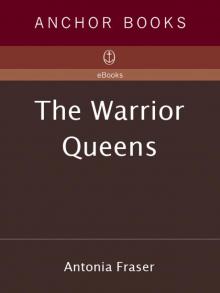 Warrior Queens
Warrior Queens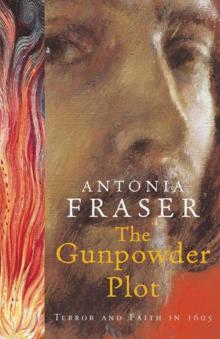 The Gunpowder Plot
The Gunpowder Plot Cromwell
Cromwell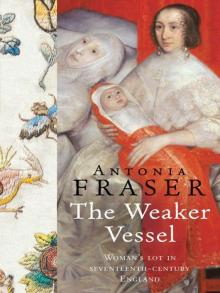 The Weaker Vessel: Women's Lot in Seventeenth-Century England
The Weaker Vessel: Women's Lot in Seventeenth-Century England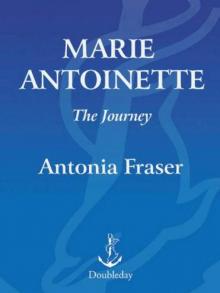 Marie Antoinette: The Journey
Marie Antoinette: The Journey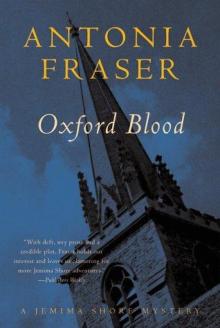 Oxford Blood
Oxford Blood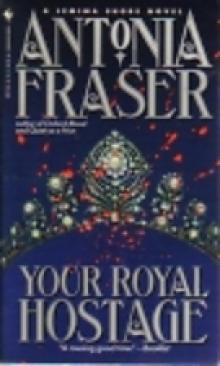 Your Royal Hostage
Your Royal Hostage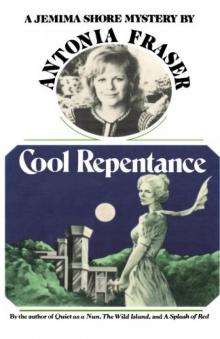 Cool Repentance
Cool Repentance Mary Queen of Scots
Mary Queen of Scots Political Death
Political Death Royal Charles: Charles II and the Restoration
Royal Charles: Charles II and the Restoration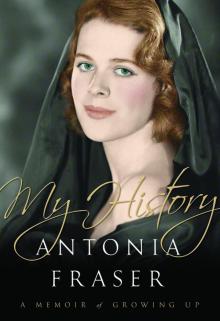 My History: A Memoir of Growing Up
My History: A Memoir of Growing Up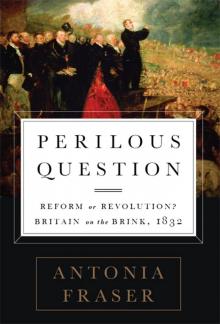 Perilous Question: Reform or Revolution? Britain on the Brink, 1832
Perilous Question: Reform or Revolution? Britain on the Brink, 1832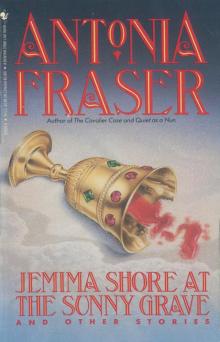 Jemima Shore at the Sunny Grave
Jemima Shore at the Sunny Grave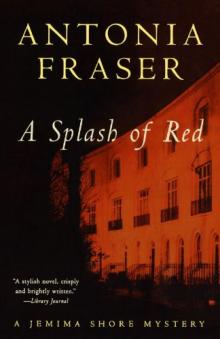 A Splash of Red
A Splash of Red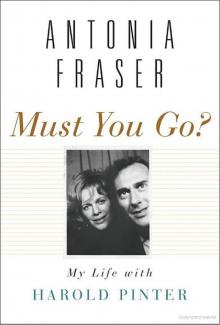 Must You Go?: My Life With Harold Pinter
Must You Go?: My Life With Harold Pinter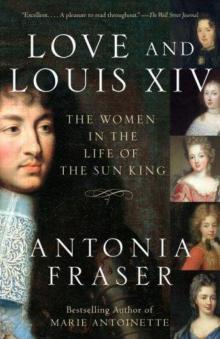 Love and Louis XIV: The Women in the Life of the Sun King
Love and Louis XIV: The Women in the Life of the Sun King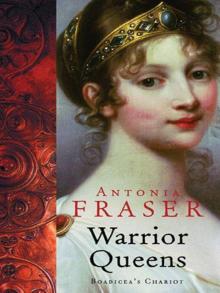 The Warrior Queens
The Warrior Queens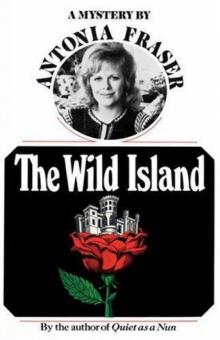 The Wild Island
The Wild Island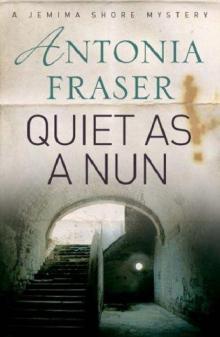 Quiet as a Nun
Quiet as a Nun Perilous Question
Perilous Question Cromwell, the Lord Protector
Cromwell, the Lord Protector Gunpowder Plots
Gunpowder Plots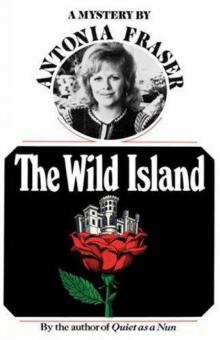 The Wild Island - Jemima Shore 02
The Wild Island - Jemima Shore 02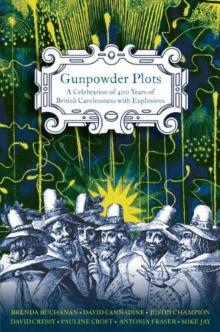 Gunpowder Plots: A Celebration of 400 Years of Bonfire Night
Gunpowder Plots: A Celebration of 400 Years of Bonfire Night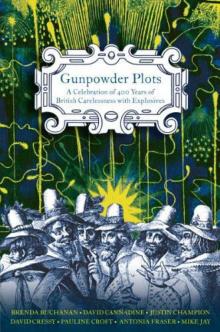 Gunpowder Plots_A Celebration of 400 Years of Bonfire Night
Gunpowder Plots_A Celebration of 400 Years of Bonfire Night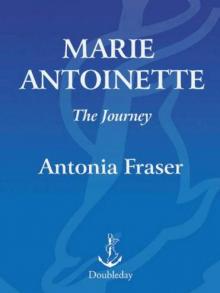 Marie Antoinette
Marie Antoinette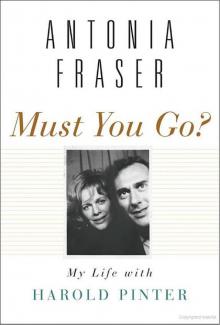 Must You Go?
Must You Go?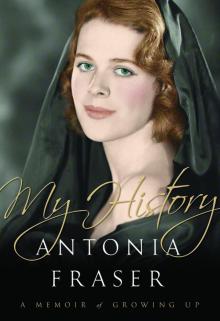 My History
My History